It seems we can’t find what you’re looking for. Perhaps searching can help.
Sign Up for newsletter!
Subscribe to get the latest eBook!
Hotline






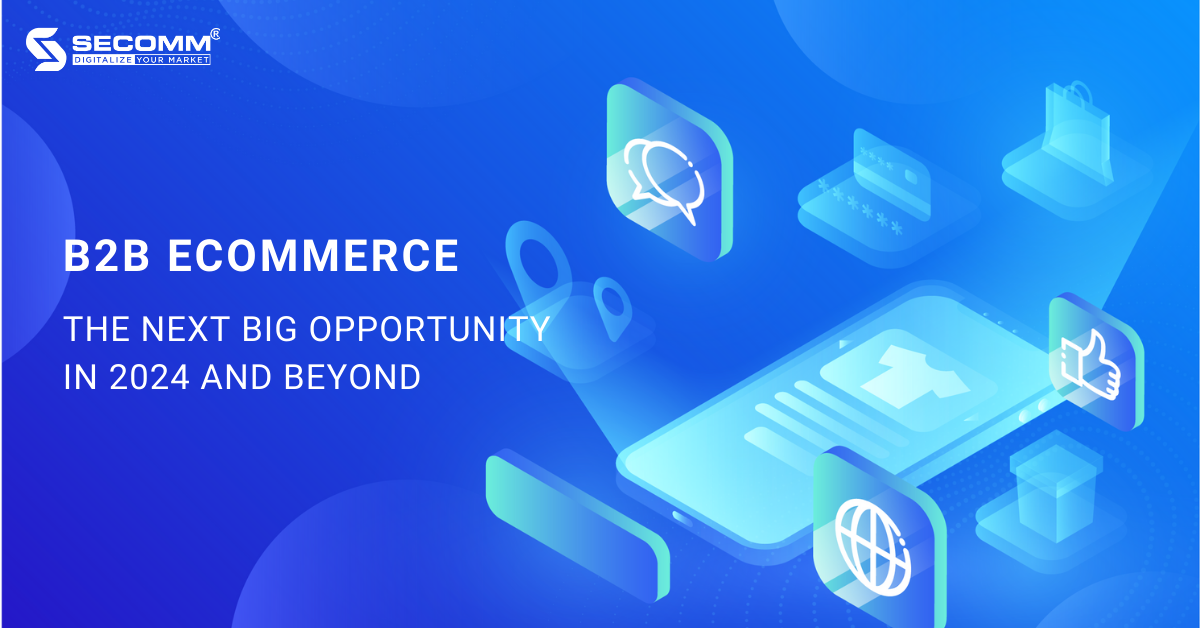
Business-to-business (B2B) eCommerce is becoming increasingly important in the modern business world. In this arena, businesses interact and conduct transactions with each other through eCommerce platforms.
When it comes to this field’s growth potential, Bobby Morrison, Shopify’s Chief Revenue Officer, confidently asserts that B2B eCommerce will be the next significant opportunity for businesses of all scales in 2024 and the years that follow.
Read more: What’s new Shopify Editions Winter ’24?
Business-to-business (B2B) eCommerce is a form of commercial transactions between businesses through eCommerce platforms. In this model, businesses don’t focus on selling directly to end consumers (as in B2C commerce); instead, they prioritize creating value for fellow business partners.
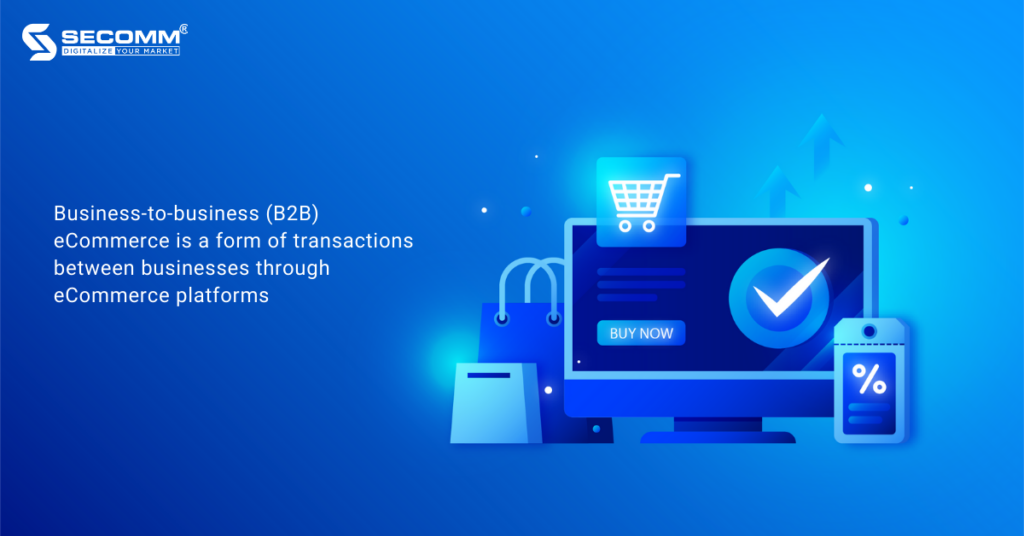
B2B eCommerce transactions may involve the exchange of goods and services, the sharing of information, and collaboration on big projects. Such interactions commonly occur between businesses operating within the same industry or along the same supply chain.
In the realm of B2B eCommerce, these transactions often have prominent scales, and high values, and are typically carried out through reliable online transaction management systems, databases, and platforms.
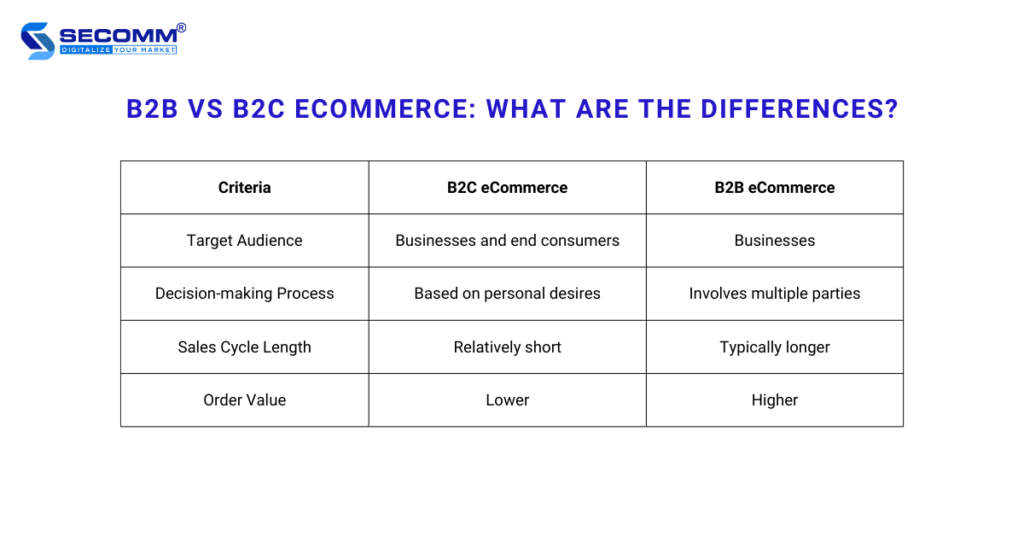
In B2B eCommerce, businesses often use several common models to interact and conduct transactions. Here are four main models:
B2B eCommerce is rapidly developing, and various online platforms are emerging to help brands implement this business model efficiently. Here are three popular platforms that B2B brands commonly use to build eCommerce websites. Each brand will choose the most suitable depending on the scale, objectives, and budget.
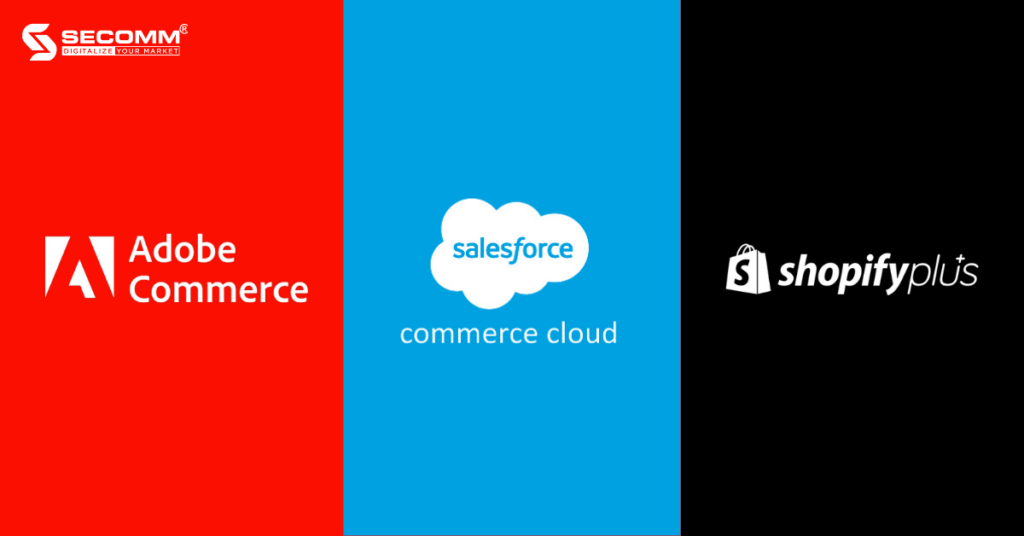
Pros:
Cons:
Pros:
Cons:
Pros:
Cons:
Read more: Top 5 B2B eCommerce platform
Booklinen is a trusted online marketplace specializing in premium bed linens. Established in 2014 with a focus on end consumers, the brand later diversified into the B2B sector as demand for larger-quantity orders grew.

Leveraging the B2B on Shopify solution, Booklinen created a visually appealing and user-friendly B2B eCommerce website, addressing the intricate needs of B2B sales operations. Furthermore, the brand can offer customers a personalized online shopping experience based on their buying behaviour, aiming to boost interaction and conversion rates.
Launched in 2015, Kulani Kinis aims to offer budget-friendly swimwear without compromising on superior quality and style. With a strong desire to expand wholesale operations like retail, Kulani Kinis has built an intuitive, user-friendly B2B eCommerce website similar to its retail site.

The B2B website enables wholesale customers to easily place orders from its extensive portfolio of over 800 products.
A notable feature is the custom collection page with a slider displaying the quantity available for all swimwear sizes. This allows customers to add multiple sizes and large quantities of products to their cart seamlessly, enabling them to enhance their shopping experience without leaving the collection page.
eJuices is a well-known brand in producing and supplying high-quality electronic liquids. The brand focuses on using safe and high-quality ingredients, ensuring that each eJuice bottle delivers excellent flavour and meets the highest safety and health standards in the vaping industry.
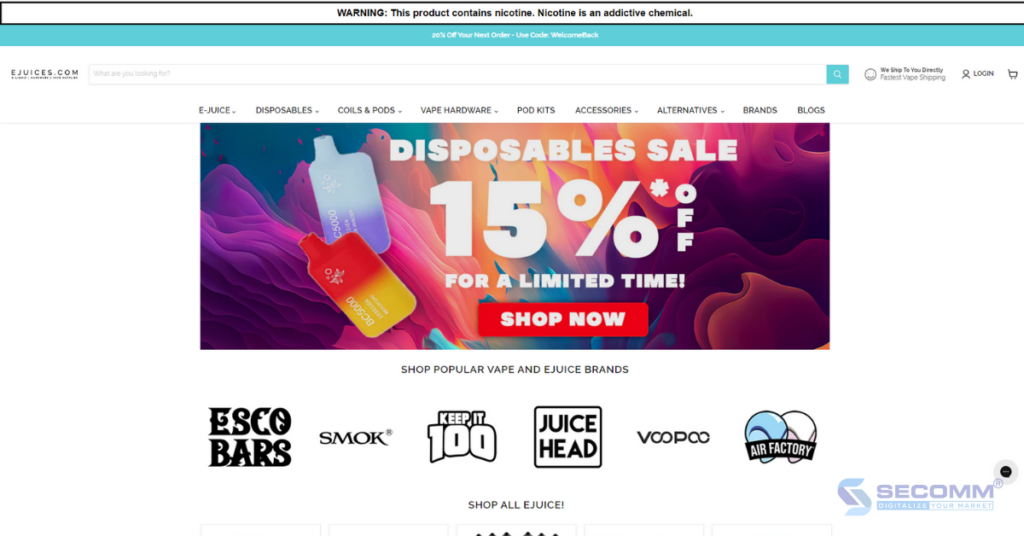
In addition to implementing a B2C model, eJuices is recognized as a genuine B2B eCommerce business. The brand has efficiently addressed inventory challenges, optimising its business operations while providing significant value to retail partners and enhancing collaborative relationships.
Build Your first b2b e-commerce website today!
Comprehending and effectively applying B2B eCommerce in your business strategy will undoubtedly open up promising new opportunities. B2B eCommerce is the key to unlocking continuous possibilities in the rapidly changing world. It isn’t just a passing trend; it presents a significant opportunity for every business’s growth and development.
If your company is considering establishing an eCommerce website and refining strategies to serve B2B customers, contact SECOMM or call the hotline (+84)28 7108 9908 today. Together, we can shape your business’s effective and sustainable future.
 2
2
 3,553
3,553
 0
0
 1
1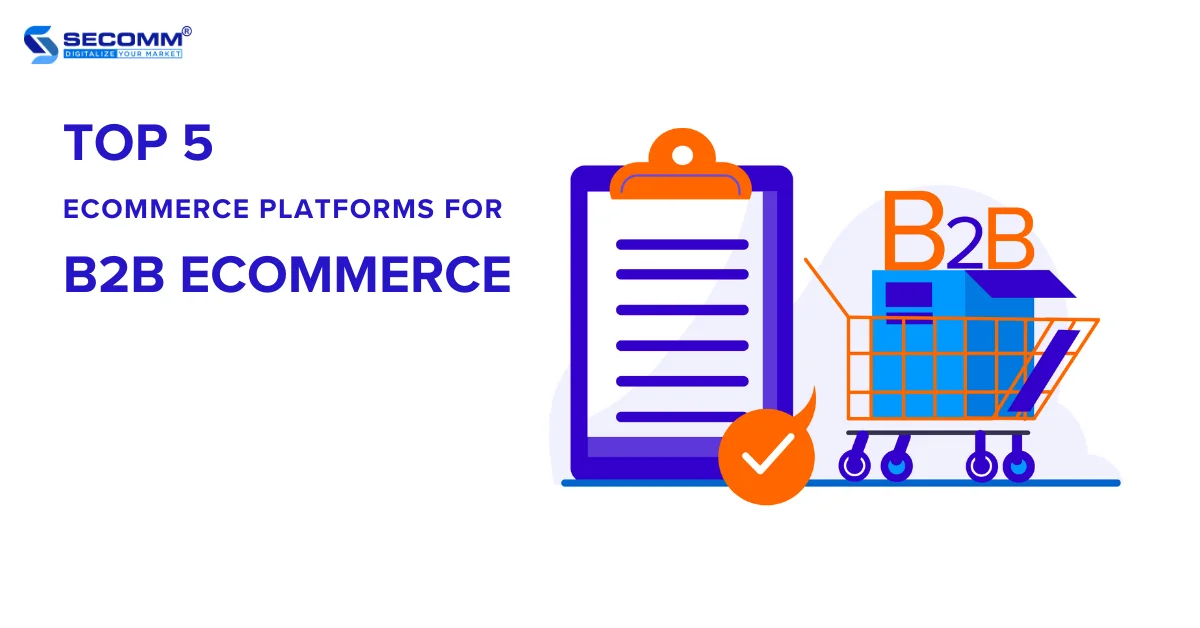
The global B2B eCommerce market is expected to reach $18.771.4 trillion by 2027.
According to McKinsey & Company, B2B enterprises are expanding their touchpoints in eCommerce, with 80% making online channels perform better than offline channels.
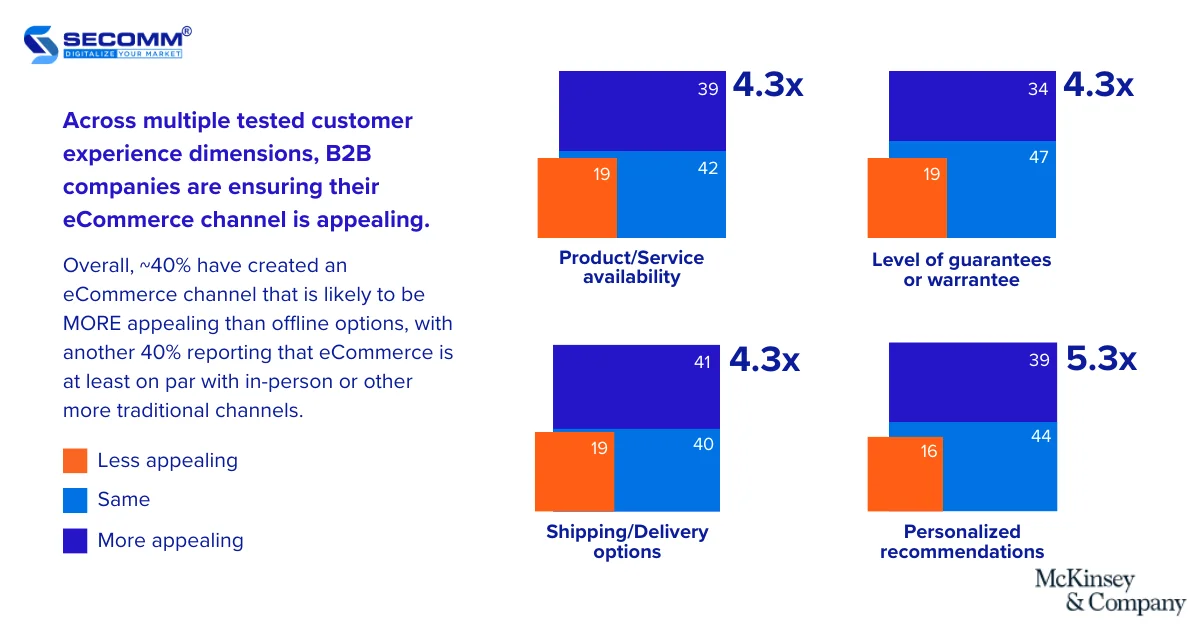
Therefore, B2B eCommerce is a rapidly growing market, with projected sales expected to reach 12.2 trillion USD by 2023. To succeed in this market, businesses always need a robust eCommerce platform.
It is crucial for businesses to clearly define the specificities and considerations of B2B eCommerce before deciding on which eCommerce platform to implement.
Specifically, Business-to-Business (B2B) eCommerce involves commercial transactions between businesses. As a result, B2B eCommerce has distinct characteristics compared to Business-to-Consumer (B2C) eCommerce, namely:
To succeed in B2B eCommerce, businesses need to take note of the following considerations:
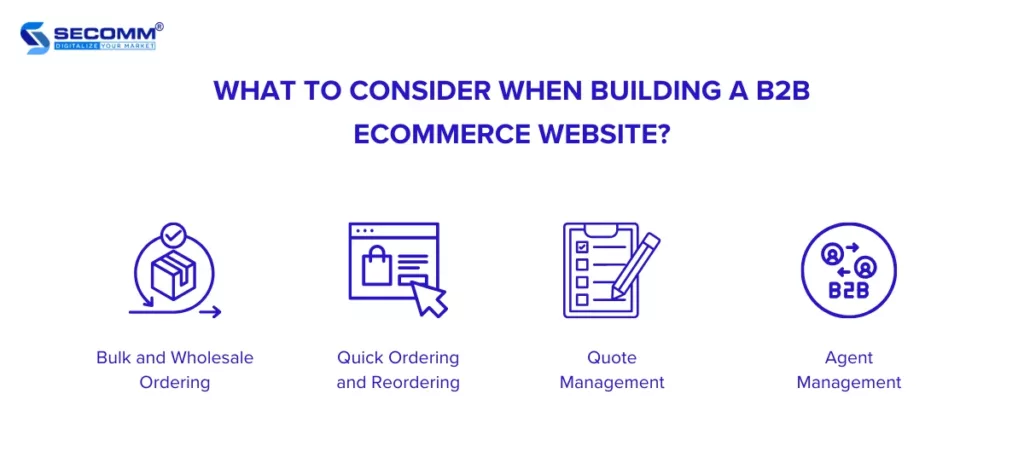
Bulk and wholesale ordering are crucial factors in the revenue of B2B businesses. The quantity and pricing can vary for each business depending on the customer group and the purchased product categories.
To efficiently handle these orders in B2B eCommerce, businesses need to use order management systems and establish clear, detailed, and appropriate order processing workflows.
The feature of quick ordering is often provided by B2B eCommerce platforms, allowing customers to create and place orders with just a few clicks. Quick ordering can be implemented through various methods, such as:
Unlike individual customers, B2B customers often repeat purchases of specific product categories in seasonal quantities. Therefore, B2B businesses should also incorporate a feature to remember previous orders for quick reordering.
Quote management in B2B eCommerce is a crucial process that helps businesses provide accurate and timely pricing information to customers, ultimately increasing sales and improving profits.
Specifically, in quote management, negotiating prices with multiple quote versions or from different suppliers is an important part of many B2B eCommerce models, allowing businesses to negotiate prices for large or complex transactions.
Managing information about agents, such as agent details, agent approval processes, agent hierarchies, credit limits, stock management for each agent, and managing discounts/commissions for agents, is essential.
Additionally, for B2B models involving multiple manufacturers and distributors, there may be a need for additional management of relationships between these entities and agents.
Therefore, depending on the current offline business model and the B2B eCommerce business model that the business aims to establish the most effective agent management process should be detailed.
Below are the top 5 eCommerce platforms for B2B businesses, capable of addressing the specificities of B2B eCommerce.
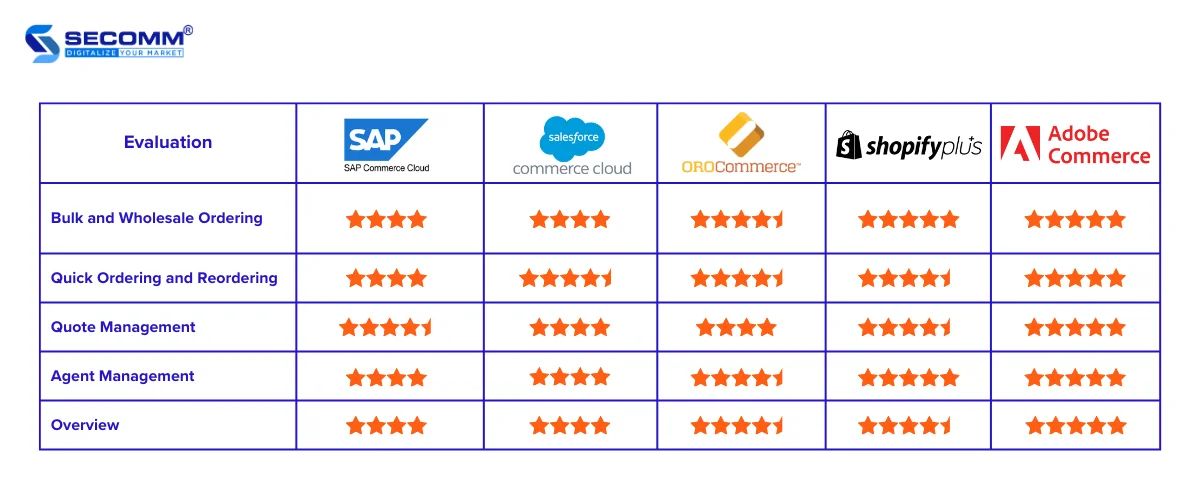
SAP Commerce Cloud is a powerful eCommerce platform suitable for B2B eCommerce businesses.
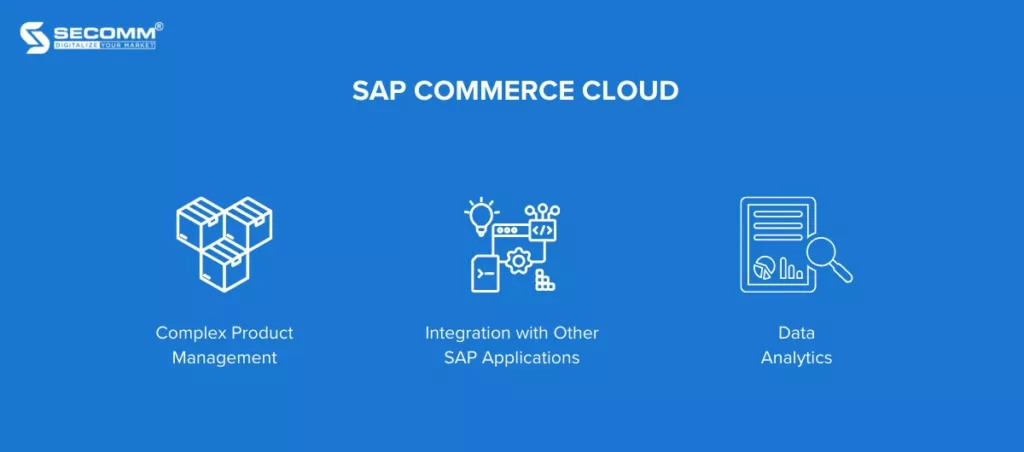
Here are some ways in which SAP Commerce Cloud can cater to B2B eCommerce:
Therefore, SAP Commerce Cloud can align with B2B eCommerce by offering features and customization capabilities to meet the specific requirements of businesses in the B2B industry.
Salesforce B2B Commerce is an eCommerce platform designed for large enterprises, including B2B businesses.
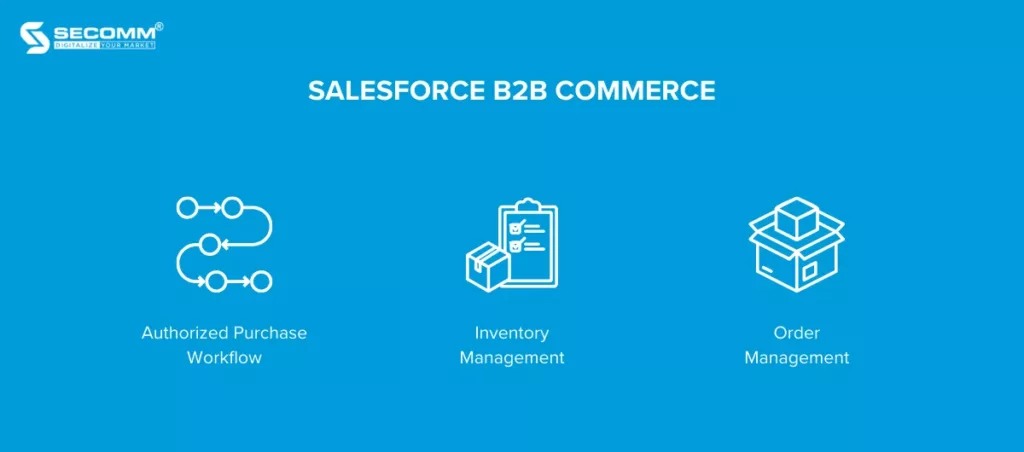
Here are some specific features and functionalities of Salesforce B2B Commerce that are suitable for B2B eCommerce:
In summary, the B2B functionalities of Salesforce B2B Commerce help B2B businesses enhance sales and customer service effectiveness.
OroCommerce is an open-source eCommerce platform designed for B2B enterprises. This platform provides powerful and flexible features, catering to the needs of B2B businesses of all sizes.
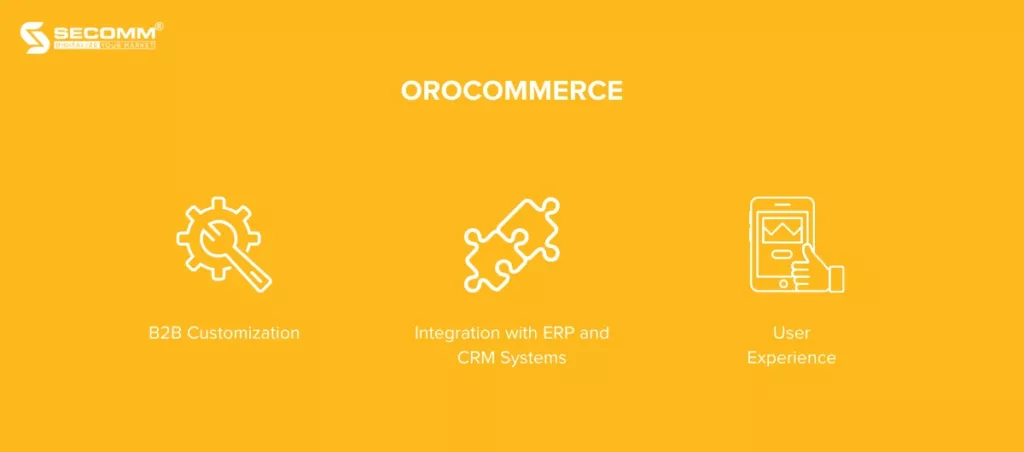
OroCommerce offers several features and functionalities specifically suitable for B2B eCommerce, including:
Overall, OroCommerce is a robust eCommerce platform worth considering for B2B enterprises.
Shopify Plus is a cloud-based SaaS eCommerce platform designed for large enterprises, especially B2B businesses.
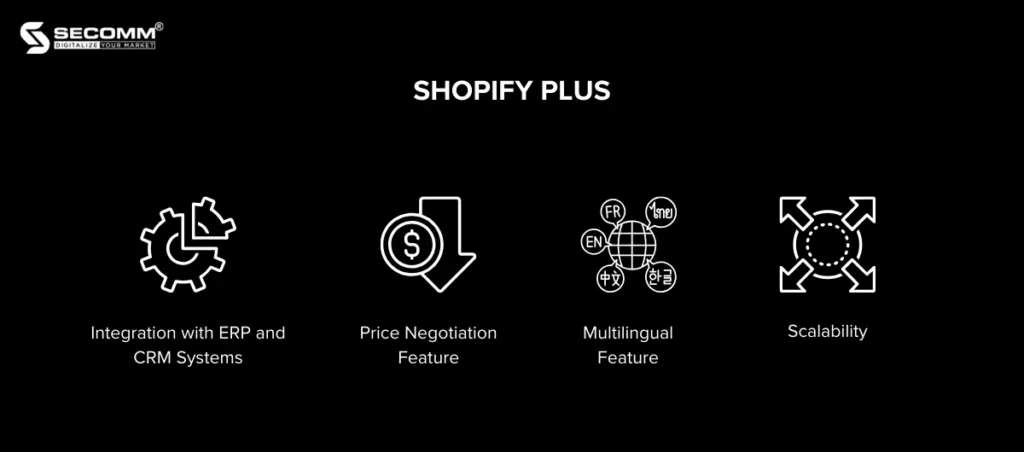
Shopify Plus provides powerful features and functionalities to meet the needs of B2B enterprises, including:
Some notable features of Shopify Plus that businesses can leverage include Shopify Flow, Shopify Launchpad, Shopify Payments, Shopify POS, etc.
Therefore, Shopify Plus is also an excellent choice for B2B businesses looking for a robust, flexible, and scalable eCommerce platform.
Xem thêm: 15 Lý do để chuyển đổi sang nền tảng Shopify Plus
Adobe Commerce (Magento) is a powerful and flexible eCommerce platform suitable for various types of businesses, including B2B enterprises.
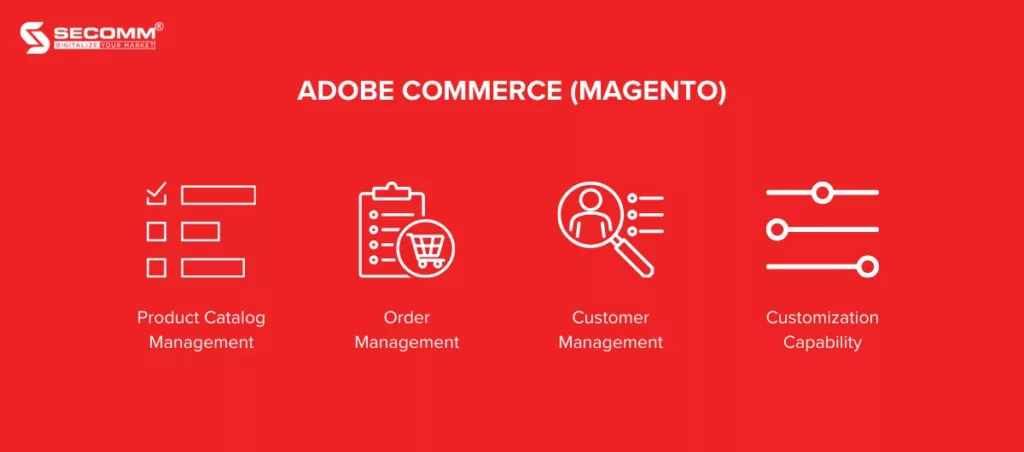
Adobe Commerce offers many features and functionalities that are well-suited for B2B eCommerce, including:
Moreover, Adobe Commerce can quickly deploy B2B-specific features thanks to its diverse ecosystem. It is also the most customizable platform among the five mentioned.
Additionally, Adobe Commerce has a large and active user community, providing support and resources for B2B businesses.
Read more: Shopify Plus vs Adobe Commerce: Key Differences 2023
Above are 5 popular platforms preferred by B2B businesses to build eCommerce websites, serving online business goals for brands.
However, choosing the most suitable platform for each business will depend on various factors, including business strategy, budget, deployment timeline, and the long-term direction set by business managers.
With deep expertise and the development of complex eCommerce systems for clients such as Changi Airport Group (Singapore), Trentham Estate (Australia), and The Warehouse (Vietnam), SECOMM understands the challenges in choosing a platform and deploying eCommerce that businesses are facing.
Contact SECOMM now or call directly at the hotline number (028 7108 9908) for free advice on the eCommerce website building roadmap!
 2
2
 8,574
8,574
 0
0
 1
1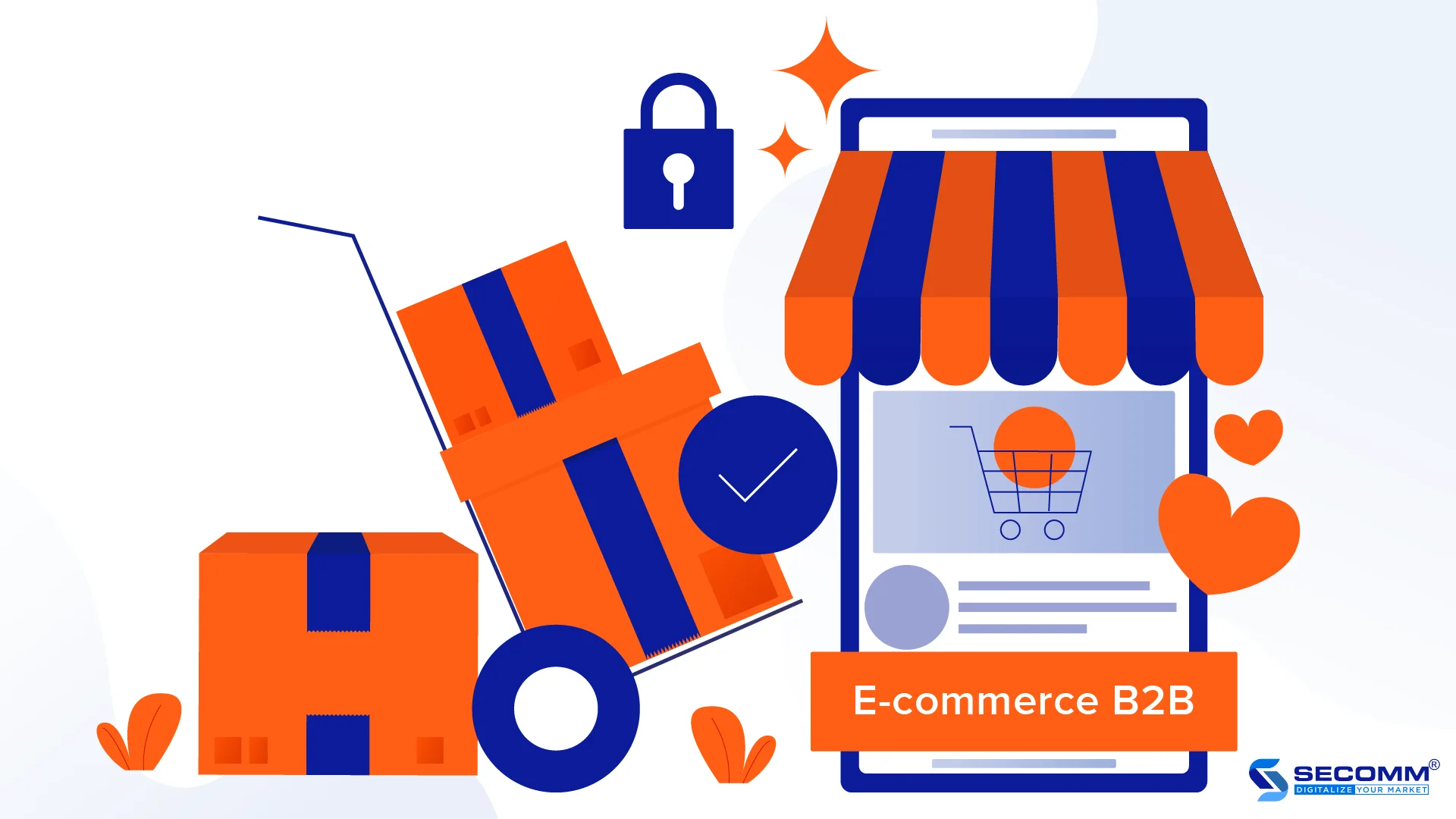
The recent Covid-19 pandemic has influenced a shift in the purchasing behaviour of consumers, including businesses in the manufacturing and wholesale markets of B2B. It has prompted businesses to gradually transition from traditional business models to Business-to-Business (B2B) ecommerce.
B2B ecommerce involves online business transactions between two enterprises. According to “The Ultimate B2B Ecommerce Guide: Tradition is out. Digital is in,” published by DHL Express, it demonstrates the significant potential of the B2B ecommerce market, projecting a growth of over 70% by 2027, equivalent to 20.9 trillion USD.
Why should businesses implement B2B ecommerce now?
A structured product catalogue interface, making product searches easier. Adding/removing products from the cart and automatically calculating the total cost makes order control more convenient. Features like keyword search, quick product filtering, fast cart access, and speedy checkout facilitate the online shopping process for customers.
Traditionally, B2B customers faced barriers in the invoicing process and traditional payment methods. Nowadays, payments in B2B ecommerce occur more quickly. Businesses can easily set up electronic invoices for data management. Customers have various payment options: Cash, Bank Transfer, Internet Banking, E-wallets, Installments, or Regular Payments. The payment process takes place on the phone or computer with an internet connection.
Ecommerce websites support online shopping consultation with features like Live Chat (direct communication with customers) and Chatbox (answering frequently asked questions without the need for a consultant).
Simplified registration process, only requiring online form registration (information collection and customer shopping needs) and the creation of electronic contracts for transaction signing.
In B2B ecommerce, detailed information on product prices and pricing policy changes is always updated on the website.
Order processing speed is faster thanks to:
Sales processes are automated through:
Production costs are reduced by producing according to customer orders instead of mass production. Additionally, it saves costs for premises, paperwork, printing, etc.
Improved post-sales services:
Building a return/exchange policy:
Regarding the personnel system:
Ecommerce B2B websites operate 24/7 with almost no staff, optimizing personnel costs. Additionally, the B2B ecommerce system supports businesses in assigning tasks and managing the progress of employees.
What data is exploited?
What can be done with this data?
Reporting:
Support business analysis and forecasting based on the collected data. Determine how factors are influenced by various elements.
Implement personalized experiences: Personalized emails, and product recommendations.
Improve revenue based on the received reports and analysis:
Plan long-term business development strategies. Introduce improvements to new products and associated services (payment, shipping, etc.).
In summary, B2B ecommerce contributes to improving business models, boosting sales, and expanding the sales network for enterprises. However, implementing B2B ecommerce is still new to many B2B business owners, and they may not know where to start and how to improve the ecommerce system!
As an expert in providing comprehensive ecommerce solutions, SECOMM supports B2B enterprises with:
Contact SECOMM now for FREE CONSULTATION SUPPORT!
 2
2
 7,451
7,451
 0
0
 1
1Subscribe to get the latest eBook!
Hotline